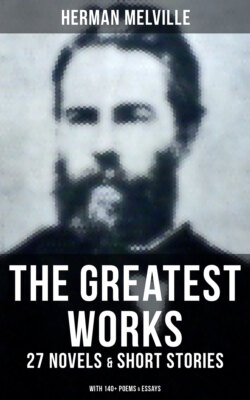Читать книгу The Greatest Works of Herman Melville - 27 Novels & Short Stories; With 140+ Poems & Essays - Herman Melville - Страница 242
На сайте Литреса книга снята с продажи.
CHAPTER 7 THEY VISIT THE LAKE OF YAMMO
ОглавлениеTable of Contents
From the Morai, we bent our steps toward an unoccupied arbor; and here, refreshing ourselves with the viands presented by Borabolla, we passed the night. And next morning proceeded to voyage round to the opposite quarter of the island; where, in the sacred lake of Yammo, stood the famous temple of Oro, also the great gallery of the inferior deities.
The lake was but a portion of the smooth lagoon, made separate by an arm of wooded reef, extending from the high western shore of the island, and curving round toward a promontory, leaving a narrow channel to the sea, almost invisible, however, from the land-locked interior.
In this lake were many islets, all green with groves. Its main-shore was a steep acclivity, with jutting points, each crowned with mossy old altars of stone, or ruinous temples, darkly reflected in the green, glassy water; while, from its long line of stately trees, the low reef-side of the lake looked one verdant bluff.
Gliding in upon Yammo, its many islets greeted us like a little Mardi; but ever and anon we started at long lines of phantoms in the water, reflections of the long line of images on the shore.
Toward the islet of Dolzono we first directed our way; and there we beheld the great gallery of the gods; a mighty temple, resting on one hundred tall pillars of palm, each based, below the surface, on the buried body of a man; its nave one vista of idols; names carved on their foreheads: Ogre, Tripoo, Indrimarvoki, Parzillo, Vivivi, Jojijojorora, Jorkraki, and innumerable others.
Crowds of attendants were new-grouping the images.
“My lord, you behold one of their principal occupations,” said Mohi.
Said Media: “I have heard much of the famed image of Mujo, the Nursing Mother; — can you point it out, Braid–Beard?”
“My lord, when last here, I saw Mujo at the head of this file; but they must have removed it; I see it not now.”
“Do these attendants, then,” said Babbalanja, “so continually new-marshal the idols, that visiting the gallery today, you are at a loss tomorrow?”
“Even so,” said Braid–Beard. “But behold, my lord, this image is Mujo.”
We stood before an obelisk-idol, so towering, that gazing at it, we were fain to throw back our heads. According to Mohi, winding stairs led up through its legs; its abdomen a cellar, thick-stored with gourds of old wine; its head, a hollow dome; in rude alto-relievo, its scores of hillock-breasts were carved over with legions of baby deities, frog-like sprawling; while, within, were secreted whole litters of infant idols, there placed, to imbibe divinity from the knots of the wood.
As we stood, a strange subterranean sound was heard, mingled with a gurgling as of wine being poured. Looking up, we beheld, through arrow-slits and port-holes, three masks, cross-legged seated in the abdomen, and holding stout wassail. But instantly upon descrying us, they vanished deeper into the interior; and presently was heard a sepulchral chant, and many groans and grievous tribulations.
Passing on, we came to an image, with a long anaconda-like posterior development, wound round and round its own neck.
“This must be Oloo, the god of Suicides,” said Babbalanja.
“Yes,” said Mohi, “you perceive, my lord, how he lays violent tail upon himself.”
At length, the attendants having, in due order, new-deposed the long lines of sphinxes and griffins, and many limbed images, a band of them, in long flowing robes, began their morning chant.
“Awake Rarni! awake Foloona!
Awake unnumbered deities!”
With many similar invocations, to which the images made not the slightest rejoinder. Not discouraged, however, the attendants now separately proceeded to offer up petitions on behalf of various tribes, retaining them for that purpose.
One prayed for abundance of rain, that the yams of Valapee might not wilt in the ground; another for dry sunshine, as most favorable for the present state of the Bread-fruit crop in Mondoldo.
Hearing all this, Babbalanja thus spoke:—“Doubtless, my lord Media, besides these petitions we hear, there are ten thousand contradictory prayers ascending to these idols. But methinks the gods will not jar the eternal progression of things, by any hints from below; even were it possible to satisfy conflicting desires.”
Said Yoomy, “But I would pray, nevertheless, Babbalanja; for prayer draws us near to our own souls, and purifies our thoughts. Nor will I grant that our supplications are altogether in vain.”
Still wandering among the images, Mohi had much to say, concerning their respective claims to the reverence of the devout.
For though, in one way or other, all Mardians bowed to the supremacy of Oro, they were not so unanimous concerning the inferior deities; those supposed to be intermediately concerned in sublunary things. Some nations sacrificed to one god; some to another; each maintaining, that their own god was the most potential.
Observing that all the images were more or less defaced, Babbalanja sought the reason.
To which, Braid–Beard made answer, that they had been thus defaced by hostile devotees; who quarreling in the great gallery of the gods, and getting beside themselves with rage, often sought to pull down, and demolish each other’s favorite idols.
“But behold,” cried Babbalanja, “there seems not a single image unmutilated. How is this, old man?”
“It is thus. While one faction defaces the images of its adversaries, its own images are in like manner assailed; whence it comes that no idol escapes.”
“No more, no more, Braid–Beard,” said Media. “Let us depart, and visit the islet, where the god of all these gods is enshrined.”
